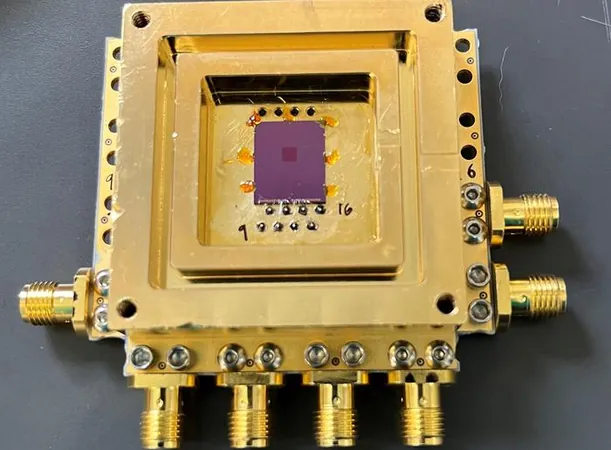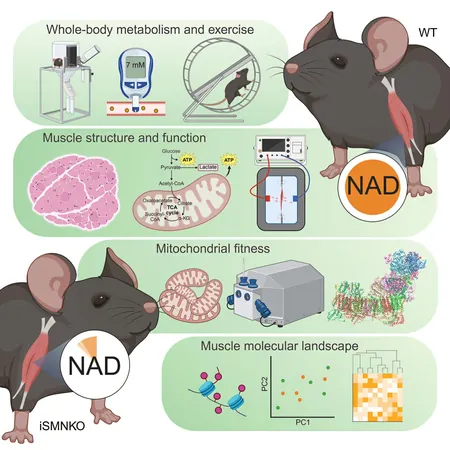
Quantum Sensors: The Game-Changer for Particle Physics
2025-04-28
Author: Emily
A New Era for Particle Physics!
Particle physics is on the brink of a groundbreaking revolution! As upcoming colliders promise to collide particles at unprecedented energies, researchers face a monumental challenge: tracking and analyzing the massive deluge of subatomic debris generated by these collisions.
The Demand for Advanced Detectors
Modern particle accelerators, like the Large Hadron Collider (LHC), have already expanded our cosmic knowledge. However, next-generation machines are set to push boundaries even further, potentially unveiling entirely new particles that defy current physics models.
With millions of particle interactions happening every second, traditional detectors may find it increasingly difficult to keep pace. Hence, there's an urgent need for technology that can comb through this chaos with extraordinary precision.
Quantum Sensors: A Revolutionary Approach
In response to this challenge, a pioneering team from Fermilab, Caltech, NASA's Jet Propulsion Laboratory, the University of Geneva, and Universidad Santa María has successfully tested innovative quantum sensors. Their groundbreaking device, known as superconducting microwire single-photon detectors (SMSPDs), has shown unprecedented efficiency.
During rigorous experiments at Fermilab, these quantum sensors demonstrated their capability to detect individual particles with remarkable time and spatial accuracy—far surpassing traditional detectors.
Maria Spiropulu, a leading physicist at Caltech, noted, "In the next 20 to 30 years, particle colliders will become increasingly powerful, and that calls for even more precise detectors. Developing quantum technology today is essential for optimizing searches for new particles, dark matter, and understanding the origins of space and time."
Why Quantum Sensors Stand Out
What makes SMSPDs a leap forward? They offer unparalleled features that set them apart:
- **4D Tracking**: These sensors grant exceptional precision in tracking particles in both space and time, essential for analyzing chaotic collision aftermaths.
- **Charged Particle Detection**: For the first time, quantum sensors efficiently detect charged particles—critical for particle physics experimentation. Conventional sensors force a compromise between spatial and temporal resolution, but SMSPDs excel in both!
Building on Quantum Discoveries
The advancements with SMSPDs build on earlier innovations with superconducting nanowire single-photon detectors (SNSPDs), which have been transformative in areas like quantum networking and space communications.
At JPL, SNSPDs have been instrumental in pioneering projects like Deep Space Optical Communications, allowing for the transmission of high-definition data over vast cosmic distances using cutting-edge laser technology. Additionally, initiatives like INQNET have harnessed SNSPDs to enable quantum teleportation, a significant stride toward realizing a quantum internet.
Gazing into the Future of Particle Physics
Looking ahead, quantum sensors will play a vital role in upcoming facilities like the Future Circular Collider and next-generation muon colliders. As experiments yield more intense collisions and intricate particle showers, accurately tracking millions of interactions per second will become imperative.
Thanks to quantum sensors, we're edging closer to the next wave of groundbreaking discoveries that could reshape our understanding of the universe!









 Brasil (PT)
Brasil (PT)
 Canada (EN)
Canada (EN)
 Chile (ES)
Chile (ES)
 Česko (CS)
Česko (CS)
 대한민국 (KO)
대한민국 (KO)
 España (ES)
España (ES)
 France (FR)
France (FR)
 Hong Kong (EN)
Hong Kong (EN)
 Italia (IT)
Italia (IT)
 日本 (JA)
日本 (JA)
 Magyarország (HU)
Magyarország (HU)
 Norge (NO)
Norge (NO)
 Polska (PL)
Polska (PL)
 Schweiz (DE)
Schweiz (DE)
 Singapore (EN)
Singapore (EN)
 Sverige (SV)
Sverige (SV)
 Suomi (FI)
Suomi (FI)
 Türkiye (TR)
Türkiye (TR)
 الإمارات العربية المتحدة (AR)
الإمارات العربية المتحدة (AR)